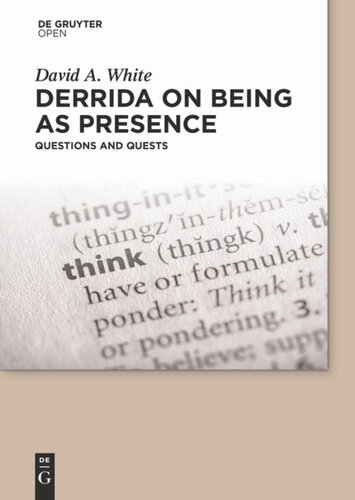

Most ebook files are in PDF format, so you can easily read them using various software such as Foxit Reader or directly on the Google Chrome browser.
Some ebook files are released by publishers in other formats such as .awz, .mobi, .epub, .fb2, etc. You may need to install specific software to read these formats on mobile/PC, such as Calibre.
Please read the tutorial at this link: https://ebookbell.com/faq
We offer FREE conversion to the popular formats you request; however, this may take some time. Therefore, right after payment, please email us, and we will try to provide the service as quickly as possible.
For some exceptional file formats or broken links (if any), please refrain from opening any disputes. Instead, email us first, and we will try to assist within a maximum of 6 hours.
EbookBell Team

4.0
86 reviewsJacques Derrida’s extensive early writings devoted considerable attention to “being as presence,” the reality underlying the history of metaphysics. In Derrida on Being as Presence: Questions and Quests, David A. White develops the intricate conceptual structure of this notion by close exegetical readings drawn from these writings. White discusses cardinal concepts in Derrida’s revamping of theoretical considerations pertaining to language–signification, context, negation, iterability–as these considerations depend on the structure of being as presence and also as they ground “deconstructive” reading.
White’s appraisal raises questions invoking a range of problems. He deploys these questions in conjunction with thematically related quests that arise given Derrida’s conviction that the history of metaphysics, as variations on being as presence, has concealed and skewed vital elements of reality. White inflects this critical apparatus concerning being as presence with texts drawn from that history–e.g., by Plato, Aristotle, Bacon, Hume, Kant, Whitehead. The essay concludes with a speculative ensemble of provisional categories, or zones of specificity. Implementing these categories will ground the possibility that philosophy in general and metaphysics in particular can be pursued in ways which acknowledge the relevance of Derrida’s thought when integrated with the philosophical enterprise as traditionally understood.
The juxtaposition of Derrida’s basic notions stated in his early work with traditional metaphysical concepts and Distinctions; the application of these evaluations to Derrida’s conclusions regarding theoretical elements in philosophy of language.